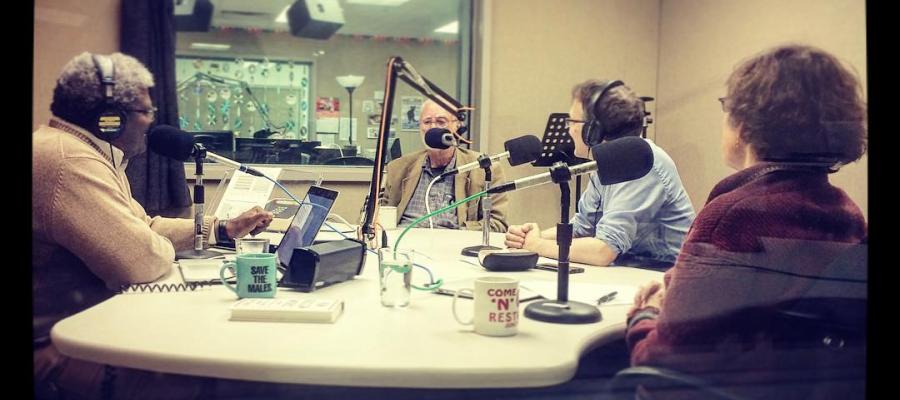Freud's Philosophical Challenges
08
Jan 2019
Last month, I started a new series of essays on Freud as a philosopher. This month, I want to lay out some of the perplexing philosophical issues that Freud and his intellectual community were confronted with towards the end of the nineteenth century, and how they grappled with them.
Read moreThe Examined Year: 2018 – Uncut
31
Dec 2018
Happy new year from your senior producer, here to offer a look behind the scenes at how this year's end-of-year special really happened.
Read moreOn Morally Condemning the Past
17
Dec 2018
The American Pediatric Association is clear that spanking harms children. In light of this information, it’s fair to say spanking children is immoral and those who spank in this day and age are doing wrong. But here’s a tricky question. How should our moral judgments of the present impact our judgments of what people did in the past?
Read moreWhy Should We Give Foreign Aid?
14
Dec 2018
Do we have a duty to help developing nations escape poverty? Or does foreign aid do more harm than good? What is the best way to end global poverty? These are some of the questions we’ll be in asking in this week’s show on foreign aid.
Read moreSubway Spreading and Personal Space (Part II)
10
Dec 2018
Last month, I provided a story of (man)spreading on the subway. It's is a simple story about two people on a crowded train with different ‘preferences’ for personal space. But it leads us to a new understanding of the ways that even everyday gestures can trigger structural and systematic inequities.
Read morePhilosophical Freud
06
Dec 2018
Most people think of Freud as a psychologist rather than as a philosopher. And worse, they often think of his work as achingly passé and of the man as a pseudo-scientist at best, and a charlatan at worst. But I think that Freud was a great philosopher who still has a lot to teach us about ourselves.
Read moreFoucault on Power
03
Dec 2018
Michel Foucault had some truly brilliant and important insights about power, insights that have had an important influence on some of today’s most prominent activist movements, and that arguably should be having more of an influence on others. It’s true that there’s a lot to take issue with in his work, but there’s also a lot to be inspired by.
Read moreThe Creative Life
23
Nov 2018
Is creativity something you’re born with, or can it be cultivated? Living a live of creativity sounds fantastic – but is it (possible) for everyone? If you think it would be wonderful to be more creative, you could try to do something about it, like take a creative writing class or something. But it’s probably not that easy.
Read moreDoes Reputation Matter?
15
Nov 2018
How much should we care about our reputation? One can easily imagine a Stoic telling us not to care at all: it’s not something that is under our control, and so our job is simply to learn not to worry about it. But it’s not clear that reputation is something that is entirely out of our control.
Read moreSubway Spreading and Personal Space (Part I)
14
Nov 2018
The phenomenon of taking up too much room on the subway has gotten a lot of attention in the last few years under the label “manspreading.” But why does this spreading happen? And what does it have to do with men in particular? The answer starts with preferences for personal space.
Read moreAnti-Semitism 101
07
Nov 2018
Many Americans seem have a hard time grasping the idea of Jews as a race because they think of race mainly in terms of the color of a person’s skin. So they tend to frame anti-Semitic violence as attacks on the Jewish faith, rather than racist terror.
Read moreThe Wrong Abortion Question
31
Oct 2018
Is abortion the murder of an innocent child? Or the exercise of a woman’s right to control her own body? Or maybe we’re focusing on the wrong question.
Read moreHow #MeToo Helps Men
23
Oct 2018
A backlash to the #MeToo movement suggests if society’s default is to believe women who claim they were sexually assaulted, that will open men up to rampant false accusations, which women will exploit for malicious purposes. But the reality is that #MeToo promotes social habits that make men less likely to be susceptible to false accusations.
Read moreCan Reason Save Us?
19
Oct 2018
Is reason our only guide to the true and the good? Or can reasonable people disagree on what is true and good? Is it simply a mistake to fetishize reason? These are some of the questions we tackle as we take on the broader question of whether reason can save us.
Read moreThey’re Only Lobsters
03
Oct 2018
The Great Chain of Being—the notion that the biosphere is partitioned into ranks, with humans at the top, and every other organism at some inferior position—is a way of thinking that’s incredibly difficult, if not impossible, to dislodge. Most of us have a strong conviction that it’s true, but we don’t have a clue why we think that.
Read moreThe Philosophy of Westworld
27
Sep 2018
At first glance, Westworld is just another show about robots run amok. If you look a little closer, though, you find all kinds of other philosophical questions in play, and you find them being explored with impressive seriousness and subtlety. At the level of philosophical reflection, this is golden-age television at its very best.
Read moreDo They Believe in God?
20
Sep 2018
A question has plagued me since the latest cluster of scandals emerged from the Catholic church. The scandals are both about clergy who sexually abused young people and about the church hierarchy’s cover-ups. The question is this: do the priests who commit such abuses believe in God?
Read moreThe Psychology of Cruelty
14
Sep 2018
Are people cruel because they lack empathy? Is cruelty always a matter of seeing others as less than human? Or are there some who simply enjoy seeing people suffer? These are some of the questions we’ll be tackling in this week’s show.
Read morePuzzle About Conspiracy Theorists (Part II)
06
Sep 2018
Conspiracy theorists think quasi-rationally, but their thinking only goes in one direction. Because conspiracy theorists are less analytic, their thinking tends not to override their starting intuitions. So how can we alleviate people's tendencies to adopt irrational conspiracy theories?
Read moreLessons from Lobsters
04
Sep 2018
At a gut level, most of us consider humans’ lives far more significant than lobsters’ lives. But does this intuition just reveal a cognitive bias most of us have? Are there any good arguments to support the idea that lobster lives matter less?
Read moreAthletics and the Philosophical Life
24
Aug 2018
The idea that athletics and philosophy are connected may sound strange at first. But if we see philosophy as a way of life rather than a set of beliefs, it’s not a stretch to imagine that athletic training can cultivate skills we need for the whole of our lives, both on and off the playing field.
Read moreShould Algorithms Decide?
14
Aug 2018
We are delegating more and more morally fraught decisions to computers and their algorithms. Many find the prospect of such a thing truly alarming. It’s hard to blame them for that. After all, how many of us would be willing to trust our own lives to a computer algorithm?
Read moreA Puzzle About Conspiracy Theorists (Part I)
10
Aug 2018
You might think that conspiracy theorists like the flat earthers don't really think about things. But if you've ever argued with one, you'll find that they do. They have an answer for everything. So how do we reconcile their irrationality with their rational thinking?
Read moreFailing Successfully
08
Aug 2018
To say that a person can fail successfully sounds really weird. To succeed at something is to achieve some goal that you’re aiming at, and to fail at something is to not achieve a goal that you were trying to achieve. But this isn’t the end of the story.
Read more#FrancisOnFilm: Mission Impossible
02
Aug 2018
Mission Impossible: Fallout is an intensely escapist movie, but it's also a deeply philosophical one. It explores the question: should you be the kind of person who saves his friends and risks millions of lives, or the kind of person for whom saving the millions matters to the exclusion of all else?
Read more- ‹ Previous
- 9 of 39
- Next ›























